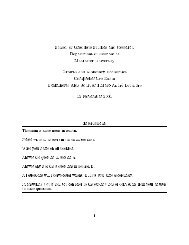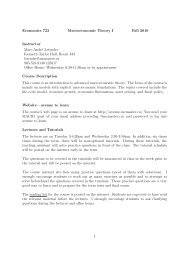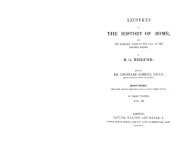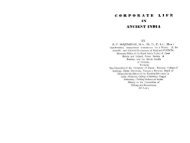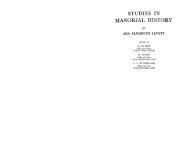L<strong>an</strong>castrimrestorationdue toEd ward'sfailure.Edward's marriage in 1464 he was mainly in their h<strong>an</strong>ds ;after that date he attempted to free himself from them byraising up his wife's relations as a counterpoise to them ;a policy which led to the renewal of the former troubles,<strong>an</strong>d ultimately to his own expulsion from the kingdom.We have the express testimony of Warkworth that therestoration of Henry V1 was rendered possible by thedisappointment felt at the perform<strong>an</strong>ces of Edward IV1.Of the action of the new government we c<strong>an</strong> form noestimate. Its duration was too short, <strong>an</strong>d most of thedocuments relating to it have perished 2. Fortescue, as weshall see, drew up for it a programme of reform which isclosely connected with our present work3.After the restoration of Edward IV a distinct ch<strong>an</strong>ge forthe worse takes place in his character <strong>an</strong>d government.Ch<strong>an</strong>ge inEdward'sgo,e,-mentarter His administration was no doubt firmer, but also morehis return.cruel <strong>an</strong>d suspicious. He was determined 'to indulge hislove of ease <strong>an</strong>d pleasure without disturb<strong>an</strong>ce, <strong>an</strong>d he remorselesslycrushed everything which threatened to becomed<strong>an</strong>gerous. <strong>The</strong> parties at the court continued <strong>an</strong>d r<strong>an</strong>high, the Wydvilles on the one side, the other nobles onthe other. It is possible that it was Edward's deliberatepolicy to secure his own independence by bal<strong>an</strong>cing oneparty against the other ; but the ultimate outcome of thispolicy was the deposition of his son <strong>an</strong>d the ruin of hisCompari- dynasty. In all this Edward showed how inferior he wasson of~ d ~ ~ in , real d statesm<strong>an</strong>ship to Henry VII, whom Mr. Green haslvwith put down as a mere imitator of Edward IV. It would not1Ienry VII. be far from the truth to say that Edward's governmenthad all the faults of that of Henry without <strong>an</strong>y of itsmerits. Common to both kings were the desire to befin<strong>an</strong>cially independent of parliament5, <strong>an</strong>d m<strong>an</strong>y of theme<strong>an</strong>s which they took to secure that object. Both kings,See notes to Chap. xix. this among the 'cautelre' of aChastellain, v. 489 f., says that tyr<strong>an</strong>t : ' Kex autem non procuratWarwick used his power with divisiones et partes in regno ;' Degreat tyr<strong>an</strong>ny <strong>an</strong>d cruelty. Regimine, 111. ii. 10 ; cf. Bacon'sS Below ; pp. 70,89.Essay, ' Of Faction.'Egidius Rom<strong>an</strong>us reckons See notes to Chaps. v, xix.to use Lord Bacon's words, made money out of their Fin<strong>an</strong>cialsubjects for war, <strong>an</strong>d out of their -enemies for peace. Other "'eaSUreS'sources of income which they had in common were theconfiscated goods of opponents, benevolences, the finesresulting from the enforcement of obsolete statutes <strong>an</strong>drights of the crown, <strong>an</strong>d the profits arising from merc<strong>an</strong>tilespeculations. <strong>The</strong>se sources of income together with thegr<strong>an</strong>ts of the clergy made Edward to some extent independentof his lay subjects, <strong>an</strong>d the people so far attainedthe wish they had so often expressed, that the king shouldlive of his own; with the result which might have beenexpected, that the voice of the nation was silenced, <strong>an</strong>dthe king did very much what he pleased.Common again to both monarchs was the system of Repressiverepression <strong>an</strong>d espionage which they adopted. This wasnecessitated in Edward's case by the disgraceful treatywith Fr<strong>an</strong>ce, which caused so much discontent, that theCroyl<strong>an</strong>d Continuator believes that the people would haverisen, if only they could have found a leader l. <strong>The</strong> me<strong>an</strong>s<strong>an</strong>d position of his humblest subjects were known toEdward in a way which reminds us not only of HenryVII, but of Burleigh <strong>an</strong>d Walsingham 2. And besidesthese evils which were common to both systems, the ruleof Edward IV had demerits which were all its own. Butthe simplest test of the relative merits of Edward IV <strong>an</strong>dHenry V11 is to compare the state in which they respectivelyleft the kingdom at their death. Henry left aunited kingdom, <strong>an</strong> assured succession, a crown independent<strong>an</strong>d secure from foreign interference. Edwardleft two bitter factions which he had fostered in life <strong>an</strong>didly f<strong>an</strong>cied he could reconcile upon his death-bed, arevolution <strong>an</strong>d a ch<strong>an</strong>ge of dynasty, <strong>an</strong>d a crown the prizeof the first pretender who could gain some foreign help. Ihave saidqhat the condemnation of the house of L<strong>an</strong>casterl P. 559.be knowne the disposition of thelb. 562, 564. <strong>The</strong> Liber countries ;' Ordin<strong>an</strong>ces, &C., p. 45.Niger of Edward IV curiously This again is a ' cautela tyr<strong>an</strong>illustratesthis point. <strong>The</strong> forty nica ;' Kg. Rom. U. S.squires of the household are to be Above, p. 35.'of sundry sheres, by whom it illay
does not involve the acquittal of the house of York.Edward IV was probably the worst king, <strong>an</strong>d certainlythe worst m<strong>an</strong>, who had occupied the English throne since<strong>The</strong> 1Tonse John. And yet it is by him that the house of York isof Yorklnainly mainly judged in history. His father never had a fairg:~zF ch<strong>an</strong>ce; the reign of Edward V is merely the history of aIV. revolution; while the government of Richard 111, until itdegenerated into a mere spasmodic attempt to maintainhimself, was a conscious <strong>an</strong>d somewhat theatrical reactionagainst Yorkist rule, rather th<strong>an</strong> a specimen of it. Dr.Stubbs has truly <strong>an</strong>d beautifully said, 'We c<strong>an</strong>not looktvithout pity <strong>an</strong>d sorrow on that generation of our fathers,whose virtues were exemplified in Henry of L<strong>an</strong>caster, <strong>an</strong>dits strength in Edward of York1.'SUCIIPART 11.LIFE OF SIR JOHN FORTESCUE.nlrthofwas the character of the period into which ourFottescue. author was born. Neither the place nor the date of hisbirth are known, but he belonged to a Devonshire family ;<strong>an</strong>d his descend<strong>an</strong>t <strong>an</strong>d latest biographer, Lord Clermont,combining a statement made by Fortescue himself in thethat no one could be made a serge<strong>an</strong>t-at-Dc Lnz~di6zts~,law till he had studied the law for sixteen years, withthe fact that Fortescue became a serge<strong>an</strong>t in I429 or 1430,places his birth about the middle of the last decade of thefourteenth century3. Mr. Foss on similar grounds placesit ' about the close of the fourteenth century '.' His father,Const. Hist, iii. 286.which seem to conflict with theC. 50. passage in the De Lazidibzcs. In'$ Family History, 2nd ed., p. 51. i. c. 43 Fortescue says S eaking of' Judges of Engl<strong>an</strong>d, iv. 309. the laws of Engl<strong>an</strong>d, P' quarunlUnfortunately there are passages peritiam studentes vir viginti <strong>an</strong>inthe Uc N(zfui-(z Lcgis Natuve norum lucubrationibus adeo ad-Sir John Fortescue, the second son of William Fortescueof Wimstone, Devon, fought at Agincourt under Henry V,<strong>an</strong>d was made Governor of RiIeaux, the capital of La Brie,upon its capture in 1422. He seems to have died about1435'. He had by his wife, who was the heiress of thefamily of Norreis, three sons. Sir Henry Fortescue, theeldest, was for a short time (June 1426-November 1427)Chief Justice of the Common Pleas in Irel<strong>an</strong>d2; thesecond, Sir John Fortescue, is the subject of the presentmemoir ; the youngest, Sir Richard Fortescue, was killedat the first battle of St. Alb<strong>an</strong>'s in 1455, fighting on theL<strong>an</strong>castri<strong>an</strong> side3. According to T<strong>an</strong>ner, the future ChiefJustice of Engl<strong>an</strong>d was educated at Exeter College,Oxford. He certainly was a member of Lincoln's Inn, Governorof which institution he was made a Governor in 1425, of Lincoln'sInn.1426, <strong>an</strong>d 1429'. Fortescue's description of the modeof life <strong>an</strong>d study in the Inns of Court5 has been sofrequently quoted that I willingly refrain from repeatingit here. It is tinged, like the whole of the work fromwhich it is taken, with a very rosy colour.Equally well known is the description of the ceremony Serge<strong>an</strong>tofmaking a serge<strong>an</strong>t-at-law6, a degree which Fortescue '"law.quirunt ut ad infimum graduin inlegibus illis . . . eligi mere<strong>an</strong>tur ;'Works, p. 108. <strong>The</strong> 'infimusgradus' must be that of apprentice-at-law,<strong>an</strong>d would of courseprecede that of serge<strong>an</strong>t-at-law.(On Apprentices. see Foss, U. S.p. 24.) Again, in ii. c. 10 he says :HEC satis novit scriptor horum,qui plusquam quadraginta <strong>an</strong>nisstuduit ac se erercuit in LecibusKegni illius, et t<strong>an</strong>dem Judiciarioofficio ejusdein term suppremodiu functus est ;' Works, pp. 124-5. If by this Fortescue me<strong>an</strong>sthat he had studied <strong>an</strong>d practisedthe English law for over forty yearsbefore his elevation to the benchin J<strong>an</strong>. I442 (<strong>an</strong>d such certainlyseems to be implied by the use ofthe word t<strong>an</strong>dent), his birth wouldhave to be thrown back at least asfar as 1385. If, on the other h<strong>an</strong>d,the forty years of study <strong>an</strong>d practiceinclude the nineteen years ofFortescue's judgeship, he c<strong>an</strong>nothave been born earlier th<strong>an</strong> 1400.And this of the two is the moreprobable date.Family History, p. 45.Ib. 44.S Ib. 235.Ib. 51.De Laudibus, c. 49.De Laudibus, c. 50. <strong>The</strong> dresswhich Fortescue describes seemsnot to have been peculiar to serge<strong>an</strong>ts-at-law,butcommon to themwith other serge<strong>an</strong>ts.<strong>The</strong> ser-ge<strong>an</strong>ts of the Counting-house wereto wear ' hoodes furred with whytelambe <strong>an</strong>d a coyfe of sylk,whyte ;'Ordin<strong>an</strong>ces, p. 65.
- Page 1 and 2: OTHER WISE CALLEDThe Difference bet
- Page 3 and 4: THE work here presented to the read
- Page 5 and 6: preface. preface, xihistorical bear
- Page 7 and 8: NOTE.-AS a general rule the authori
- Page 9 and 10: xviii CLbconological Cable, QLbrono
- Page 11 and 12: INTRODUCTION.PART I.TIIE fifteenth
- Page 13 and 14: Key-note ' The key-note of the Lanc
- Page 15 and 16: 3(n troduction,His reign only as de
- Page 17 and 18: directed, and they must therefore b
- Page 19 and 20: crimes from punishment'. This evil,
- Page 21 and 22: Perversionof justice.Localoffice1 S
- Page 23 and 24: Influence use their local power to
- Page 25 and 26: houses of Parliament an oath agains
- Page 27 and 28: Tumber of action lay1. One cause of
- Page 29: The House been judged in history fo
- Page 33 and 34: life as ahnrrister.become possessed
- Page 35 and 36: ford Castle a prisoner named Thomas
- Page 37 and 38: Anarbitra- Wentworth and Sir John F
- Page 39 and 40: The Lancastriansretirenorthwards.Ag
- Page 41 and 42: which they said was ruining the cou
- Page 43 and 44: Illterview way alone. At Bdthune th
- Page 45 and 46: feelings the exiles received the ne
- Page 47 and 48: Requiredto write infavour ofthe Yor
- Page 49 and 50: Other come down to us for the most
- Page 51 and 52: And moche good truly gotyn hath bee
- Page 53 and 54: Date.The DeI.arrcfi6usLegurnA uglii
- Page 55 and 56: The RIS. is well and correctly writ
- Page 57 and 58: cording to Mr. Thompson, is of the
- Page 59 and 60: I'robably On the whole, the second
- Page 61 and 62: Aquinas, six I have failed to trace
- Page 63: Fortescue'scontemporaries.Littleton
- Page 66 and 67: sithpn thai had a kynge, wich was G
- Page 68 and 69: that cause and for gret necessite w
- Page 70 and 71: such meane. And yet of necessite th
- Page 72 and 73: and sqviers, and oper, in also gret
- Page 74 and 75: or by lande, pe kyng most encomptre
- Page 76 and 77: grettest lordes off Englond, rose a
- Page 78 and 79: as hynl liste. And by discente per
- Page 80 and 81:
haue wherwith to bie hem bowes, arr
- Page 82 and 83:
Ther is no man hanged in Scotlande
- Page 84 and 85:
e kyng be counsellyd to restrayne g
- Page 86 and 87:
pe Romans, but also is hyghnes shal
- Page 88 and 89:
muned and del~bered with his fforsa
- Page 90 and 91:
CRITICAL NOTES.CHAPTER I.P. 109. 1.
- Page 92 and 93:
Bfbe bobernance of QEnfiian'tr,CHAP
- Page 94 and 95:
1. 24. parcial] parcialite L (from
- Page 96 and 97:
for granting taxes was the same as
- Page 98 and 99:
moral philosophy, but consists of a
- Page 100 and 101:
are brought about by the sin of man
- Page 102 and 103:
note$+ QLbap. ii,regendo: non autem
- Page 104 and 105:
note$+ CCbap, ii,up in the most une
- Page 106 and 107:
Later statutes fixed the limit of l
- Page 108 and 109:
&be bobernanre of QEngIanD*applied
- Page 110 and 111:
of the household of George Duke of
- Page 112 and 113:
RgidiusRumanus.. . . homines sibi s
- Page 114 and 115:
note see Janet, i. 35 1-373, 396,42
- Page 116 and 117:
'Ordinaryand extraordinaryexpenditu
- Page 118 and 119:
p----p---3723ESTIMATED EXPENDITURE.
- Page 120 and 121:
pestifera.' Very possibly Fortescue
- Page 122 and 123:
i the clerkys off theschekquer.] Be
- Page 124 and 125:
eciting how 'the seid Duc . . . lat
- Page 126 and 127:
was defined by Parliament in 4 Edwa
- Page 128 and 129:
punish ' piratas et spoliatores mer
- Page 130 and 131:
marchandyse is lost, . . . the see
- Page 132 and 133:
Transition pensiononmg, as it was d
- Page 135 and 136:
@Lbap+ bii,commiscomissioners in gr
- Page 137 and 138:
ap1-0,Bterc,cjzt4IjAnd on the other
- Page 139 and 140:
Charleshlartel.Fall of theCarolingi
- Page 141 and 142:
the Abbey of S. Albons' (July: Past
- Page 143 and 144:
York, married Constance and Isabell
- Page 145 and 146:
Taxon France, ii. 526, 533-4, 547,
- Page 147 and 148:
499 b). And no less than ~o,ooo mar
- Page 149 and 150:
which was probably in Fortescue's m
- Page 151 and 152:
holders of such grants are however
- Page 153 and 154:
286 Cbe Booernance of Qngianb.exter
- Page 155 and 156:
teristic of the Lancastrian times,
- Page 157 and 158:
such a contenuall counsell.] ' The
- Page 159 and 160:
character which the council might p
- Page 161 and 162:
which can not counsele hym' (Append
- Page 163 and 164:
306 &be bobernance of QEnglanD.'whe
- Page 165 and 166:
Sicque horum mediis concessit tande
- Page 167 and 168:
Ebe bobernance of QEngland.qualific
- Page 169 and 170:
Controlof the exchanges.Jealousyof
- Page 171 and 172:
during good behaviour. The Master o
- Page 173 and 174:
Cbe Qiobernance of QEngIand,says: '
- Page 175 and 176:
should be Justice, Chamberlain, Cha
- Page 177 and 178:
Offices per- system of executing of
- Page 179 and 180:
Defined by (e.g. Rot. Parl. v. 2 73
- Page 181 and 182:
have been detailed in the notes to
- Page 183 and 184:
of Sir Harris Nicolas there). This
- Page 185 and 186:
iiij. lordis temporelx, or in lasse
- Page 187 and 188:
y a pretensed title, saying he ys d
- Page 189 and 190:
'every broker, brogger, andhuckster
- Page 191 and 192:
suffre, suffer, 152. 14 ; soeffre,
- Page 193 and 194:
Cade, rising of, pp. 11, 284; hisco
- Page 195 and 196:
~ .-.~--hopes entertained of him, p
- Page 197 and 198:
Franchise, question of, in medizval
- Page 199 and 200:
Loans raised by the government,pp.
- Page 201:
Pisa, Council of, p. 243. .Pitt, se



